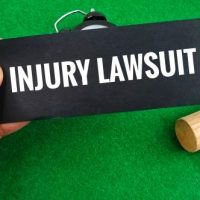How Are Pre-Existing Injuries Handled in an Injury Trial?

If you are in an accident where you sustain an injury the party you are suing, will want to see your medical records. That makes sense—you’re saying you were injured so naturally they would want documentation of your injuries.
But you may be surprised to learn that not only is the other side asking for documentation of your injuries from this accident, but they are asking for medical records that go far back, perhaps years back, records from doctors and medical providers that have nothing to do with this accident or injury.
Why Are They Asking for All This Old Medical Information?
To understand why, you must understand that to win a negligence injury case, you must show that the accident caused your injuries.
If you are a totally healthy person, who has never gone to a doctor for any kind of injury or ailment or disability, then it’s obvious that the accident caused your injuries—you had no disabilities before the accident. All of your injuries from this accident are “new.”
But reality doesn’t work like that. Past a certain (often young) age, all of us have had some kind of illness, or disability or injury.
The insurance company or Defendant on the other side of your case, is combing through your prior medical records, to find some injury that’s similar to what you have now, so that it can argue that the accident didn’t cause your injuries, but rather, you had those injuries from long before the accident.
Can You Still Win?
You can still win a case, even if you have had prior injuries that are similar to the ones suffered in your current accident.
The solution for an injury victim who does have some similar previously existing injuries or ailments, is to show that the injuries that the victim had before the accident, were made worse, or were exacerbated, by the accident.
Showing Exacerbation
This can be done a number of ways.
Objectively, you may have medical records that show exacerbation—for example, an MRI you had in, say, 2015 shows a slightly bulging disc, while your MRI from right after your recent accident, shows a fully herniated disc.
You can use common sense as well. Imagine someone who, years ago sought out the help of a therapist for depression. Now, after an accident, that person has a lack of concentration, brain fogginess, and irritability (all telltale signs of traumatic brain injury).
Since 2015, up until the recent accident, the person was fine—he played with his kids, did sports, and excelled at his job. But since the accident, he can’t do any of that. This kind of evidence might show a jury that the therapy the person had in 2015, was completely unrelated to the symptoms of the traumatic brain injury suffered in this recent accident.
Don’t let a prior injury or disease stop you from getting compensation for injuries sustained in an accident. Call our Boston personal injury lawyers at The Law Office of Joseph Linnehan, Jr. today at 617-275-4200.
